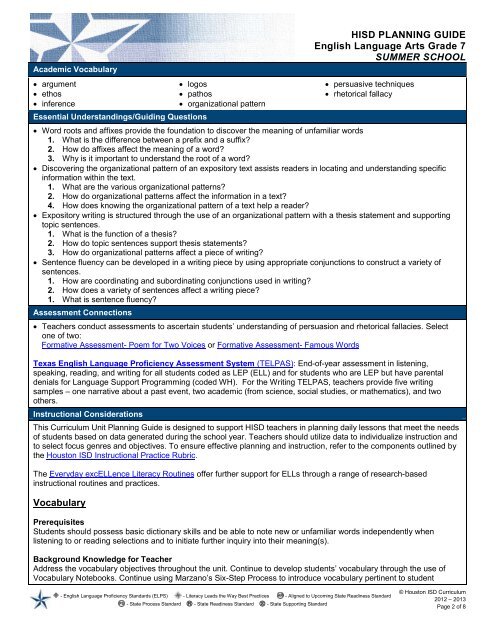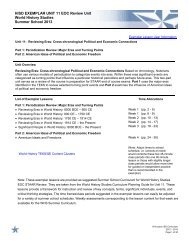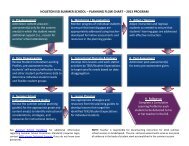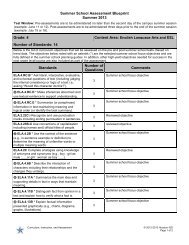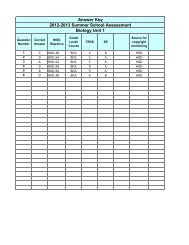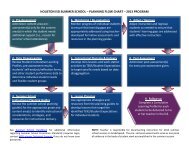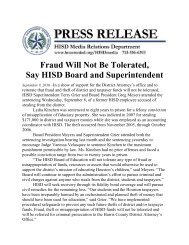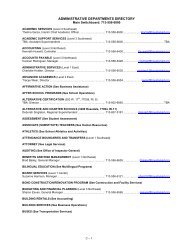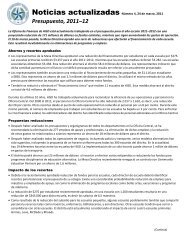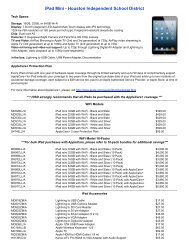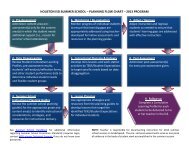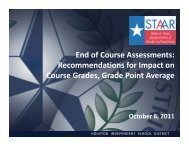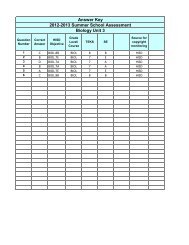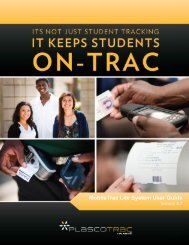SSK Unit 4.2 Planning Guide
SSK Unit 4.2 Planning Guide
SSK Unit 4.2 Planning Guide
- No tags were found...
Create successful ePaper yourself
Turn your PDF publications into a flip-book with our unique Google optimized e-Paper software.
Academic Vocabulary• argument• ethos• inferenceEssential Understandings/Guiding Questions• logos• pathos• organizational patternHISD PLANNING GUIDEEnglish Language Arts Grade 7SUMMER SCHOOL• persuasive techniques• rhetorical fallacy• Word roots and affixes provide the foundation to discover the meaning of unfamiliar words1. What is the difference between a prefix and a suffix?2. How do affixes affect the meaning of a word?3. Why is it important to understand the root of a word?• Discovering the organizational pattern of an expository text assists readers in locating and understanding specificinformation within the text.1. What are the various organizational patterns?2. How do organizational patterns affect the information in a text?4. How does knowing the organizational pattern of a text help a reader?• Expository writing is structured through the use of an organizational pattern with a thesis statement and supportingtopic sentences.1. What is the function of a thesis?2. How do topic sentences support thesis statements?3. How do organizational patterns affect a piece of writing?• Sentence fluency can be developed in a writing piece by using appropriate conjunctions to construct a variety ofsentences.1. How are coordinating and subordinating conjunctions used in writing?2. How does a variety of sentences affect a writing piece?1. What is sentence fluency?Assessment Connections• Teachers conduct assessments to ascertain students’ understanding of persuasion and rhetorical fallacies. Selectone of two:Formative Assessment- Poem for Two Voices or Formative Assessment- Famous WordsTexas English Language Proficiency Assessment System (TELPAS): End-of-year assessment in listening,speaking, reading, and writing for all students coded as LEP (ELL) and for students who are LEP but have parentaldenials for Language Support Programming (coded WH). For the Writing TELPAS, teachers provide five writingsamples – one narrative about a past event, two academic (from science, social studies, or mathematics), and twoothers.Instructional ConsiderationsThis Curriculum <strong>Unit</strong> <strong>Planning</strong> <strong>Guide</strong> is designed to support HISD teachers in planning daily lessons that meet the needsof students based on data generated during the school year. Teachers should utilize data to individualize instruction andto select focus genres and objectives. To ensure effective planning and instruction, refer to the components outlined bythe Houston ISD Instructional Practice Rubric.The Everyday excELLence Literacy Routines offer further support for ELLs through a range of research-basedinstructional routines and practices.VocabularyPrerequisitesStudents should possess basic dictionary skills and be able to note new or unfamiliar words independently whenlistening to or reading selections and to initiate further inquiry into their meaning(s).Background Knowledge for TeacherAddress the vocabulary objectives throughout the unit. Continue to develop students’ vocabulary through the use ofVocabulary Notebooks. Continue using Marzano’s Six-Step Process to introduce vocabulary pertinent to student - English Language Proficiency Standards (ELPS) - Literacy Leads the Way Best Practices - Aligned to Upcoming State Readiness Standard- State Process Standard R - State Readiness Standard S - State Supporting Standard© Houston ISD Curriculum2012 – 2013Page 2 of 8


